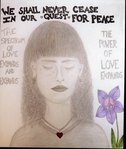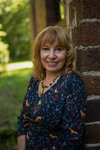

Two poets. Two different styles. One shouts. The other whispers. Both are committed to nature and social justice. Both recently published books you should read.
Kathie Kuhn of Lansing has written a 132-page collection, “The Truth for a Change,” which uses mixed-media art to frame her written words, while Rosalie Sanara Petrouske of Grand Ledge has found her voice in a more traditional chapbook, “Tracking the Fox,” a slim volume of 28 poems honoring her father and his love of the natural world.
In her book, Kuhn delves into what she calls “a poetic vision of global peace and justice issues with the goal of reducing suffering and encouraging love.”
In the poem “River,” she writes,
You’re like the wind to me …you come and you go
But I feel you all the time
Whether rain, sunshine or snow
And like a river
I hear the song of your soul
In my soul
You are a friend to me
A comfort and calm…
What makes Kuhn’s book different from most is that the poems are in her own handwriting, and many are illustrated or reproduced on ceramic tiles, which she created at Sunset Clay Studio in Lansing.
Kuhn has been using ceramic tiles as a medium for her creative expression for more than 18 years. They typically carry words of encouragement like “WATER IS LIFE,” “LOVE OF SEA, LOVE OF LAND” and “FORGIVENESS,” and many are punctuated with peace signs.
“I’ve been writing and painting all my life, and this book is a culmination of my life’s work,” she said.
In addition to her dedication to planetary survival, Kuhn’s poetry and art tackle misogyny, racism and world peace.
“I want to make the world more beautiful and get people to realize no one is untouched by these things,” she said.
Now contrast Petrouske’s chapbook with Kuhn’s. The cover art of Petrouske’s book, which won The Poetry Box Chapbook Prize in 2022, is more sublime, with a beautiful watercolor portrait of a fox looking off in the distance.
“When I started writing the collection, it was to honor my father. I didn’t know when I started that it would evolve into poems on nature, the stars and what you discover in the woods,” Petrouske said.
Her father, of Ojibwe origin, grew up on Sugar Island and was adopted by a foster family.
“I remember taking long walks with him in the woods — exploring nature,” she said.
In the poem “True North,” she writes,
In the woods, my father never needed a compass.
He told time by the sun’s position.
When shadows grew long and slanted,
he still knew the way to turn
so we could find home.
Home to Petrouske was the Upper Peninsula, where she lived in various areas while her father worked in the timber industry. A hardscrabble existence, but for the poet, it was a wonderful time to explore the woods with her father.
She writes,
‘If you think you are lost,’ Father told me, ‘travel downhill,
search for water, read the night sky,’ and he pointed
at Polaris, perched at the tip of the Little Dipper’s handle.
Several of the poems explore Petrouske’s Ojibwe roots, including “Eating Corn Soup under the Strawberry Moon,” “Black Ash Basket” and “The Medicine Bag.”
In “Black Ash Basket,” she recalls exploring ancient art with her daughter to connect with their roots, and in “The Medicine Bag,” she writes metaphorically about an Ojibwe relic,
This is the medicine bag of my father’s people.
Here is a sacred Eagle feather,
an arrowhead deep within,
a handkerchief stained with coughed-up blood.
Of late, Petrouske has focused more and more on her Ojibwe roots and is working on a series of poems about Indian boarding schools. Although still in development, the boarding school chapbook is likely to be her next collection of work.
Both Petrouske’s and Kuhn’s works are influenced by where and when they were born: Petrouske under the clear skies of the Upper Peninsula and Kuhn on Nov. 15, 1969, the day of the largest antiwar march in Washington, D.C.
Support City Pulse - Donate Today!
Comments
No comments on this item Please log in to comment by clicking here